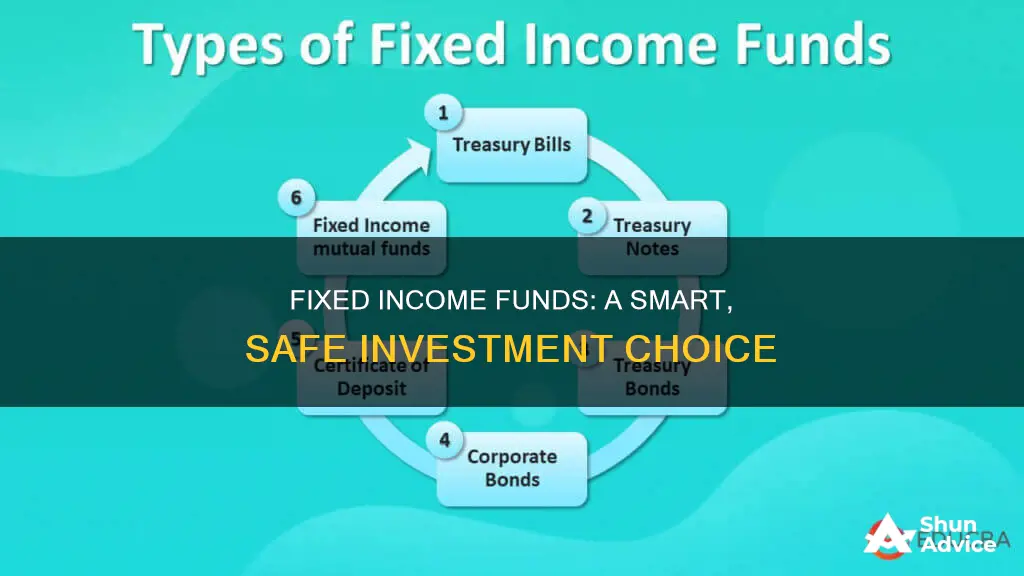
Fixed-income funds are mutual funds that focus on investing in debt securities, such as government bonds and debentures. They are considered a vital tool for investors who want to take on moderate risk and have an investment period of 1-2 years or more. Fixed-income funds are also important for investors with a portfolio of asset allocation investments because they can help reduce investment risk and provide liquidity. Fixed-income funds are suitable for investors who do not want much risk and do not expect high returns. They are also a good option for those who missed the opportunity to buy government bonds or bonds of private companies that tend to be in high demand during the offering period.
| Characteristics | Values |
|---|---|
| Returns | More stable returns than stocks |
| Returns are often lower than other investments | |
| Risk | Higher claim to the assets in bankruptcies |
| Government and FDIC backing on some | |
| Considered lower risk than stocks | |
| Credit and default risk exposure | |
| Susceptible to interest rate risk | |
| Sensitive to inflationary risk | |
| Preservation of capital | |
| Diversification | |
| Capital preservation | |
| Tax exemptions |
What You'll Learn
- Fixed-income funds are a good option for investors who don't want high risk and are happy with moderate returns
- Fixed-income funds are suitable for investors who have a portfolio of asset allocation investments
- Fixed-income funds can be used as liquidity in situations that require cash
- Fixed-income funds are recommended for conservative investors seeking a diversified portfolio
- Fixed-income funds are a good option for those approaching retirement

Fixed-income funds are a good option for investors who don't want high risk and are happy with moderate returns
Fixed-income funds are suitable for investors seeking moderate risk and returns, especially those with a short to medium-term investment horizon of around 1-2 years or more. The funds primarily invest in debt securities, such as government bonds and corporate bonds, which offer fixed interest rates until maturity. At maturity, investors receive the principal amount they originally invested, along with the interest accrued over time.
One advantage of fixed-income funds is their lower risk profile. They are considered less volatile than stocks and provide a stable income stream. Additionally, in the event of a company's bankruptcy, fixed-income investors are often prioritised for repayment before common stockholders. This makes them a good option for investors who want to minimise risk.
Another benefit of fixed-income funds is their ability to reduce investment risk through diversification. By investing in a range of bonds and debt instruments, investors can lower the impact of market fluctuations on their portfolio. This diversification can help stabilise the risk-return profile of an investor's portfolio.
It is important to note that fixed-income funds are not completely risk-free. They are subject to credit risk, where the issuer may fail to make timely payments, and interest rate risk, where the value of the investment may decrease if market interest rates rise. However, fixed-income funds that invest in highly-rated securities, such as US government bonds, are generally considered to have lower credit risk.
Overall, fixed-income funds offer a good option for investors seeking moderate returns with lower risk. They provide a steady income stream, diversification benefits, and a more stable investment option compared to stocks. However, investors should carefully consider the risks associated with these funds and choose funds with underlying holdings that match their risk tolerance and investment objectives.
Co-Investing: Why Funds Collaborate for Mutual Success
You may want to see also

Fixed-income funds are suitable for investors who have a portfolio of asset allocation investments
Fixed-income funds can help reduce the risk of investment portfolios and can be used as liquidity in situations that require cash to adjust the portfolio. They are also a good option for investors who have missed the opportunity to buy government bonds or bonds of private companies that tend to be in high demand during the offering period.
Fixed-income funds are recommended for conservative investors seeking a diversified portfolio. The percentage of the portfolio dedicated to fixed income depends on the investor's investment style. For example, an investor might choose to diversify their portfolio with a mix of fixed-income products and stocks, such as a portfolio of 50% fixed-income products and 50% stocks.
Fixed-income funds can provide a steady stream of income and help preserve capital, making them particularly important for investors approaching retirement. They can also help to stabilise the risk-return in an investment portfolio, known as market risk. The stable interest payments from fixed-income products can offset losses from declines in stock prices, helping to diversify the risk of an investment portfolio.
Overall, fixed-income funds are a suitable option for investors with a portfolio of asset allocation investments, as they can help reduce risk, provide liquidity, and offer a steady income stream.
Mutual Funds Philippines: Best Time to Invest
You may want to see also

Fixed-income funds can be used as liquidity in situations that require cash
Fixed-income funds can be used as a source of liquidity in situations that require cash. They are considered a vital tool for investors who want to moderate their risk and have a short-term investment horizon of 1-2 years or more. Mutual funds, for example, can help investors reduce the risk of their investment portfolios.
Fixed-income funds provide investors with a steady stream of income, making them ideal for those seeking a consistent and predictable income. These funds are also suitable for investors who do not want to take on much risk and are not expecting high returns. The funds are designed to generate a specific level of interest income while also providing diversification and capital preservation.
Fixed-income funds are often used by investors who want to diversify their portfolios. These funds can help smooth out the highs and lows of a stock portfolio. They are also suitable for those who want to add stability to their portfolio, as they are considered lower-risk investments compared to stocks.
Additionally, fixed-income funds can be a good option for investors who missed the opportunity to buy government or corporate bonds during the offering period. These funds provide access to a range of debt securities, including government bonds and corporate bonds, which may be difficult to purchase individually.
Mutual Fund Investment: Best Day to Invest and Grow Wealth
You may want to see also

Fixed-income funds are recommended for conservative investors seeking a diversified portfolio
Fixed-income funds are considered to be an important tool for investors who want moderate risk and have an investment period of 1-2 years or more. They can also help reduce the risk of investment portfolios and can be used as liquidity in situations that require cash adjustments. Fixed-income funds typically have lower returns and lower risk than stocks. They are suitable for investors who do not want much risk and do not expect high returns.
When investing in fixed-income funds, it is important to consider the credit rating of the debt securities. The credit rating is a tool that measures the risk of default of the debt securities. The higher the credit rating, the lower the risk of default. Fixed-income funds can also provide a steady stream of income, which is especially important for retired individuals or those approaching retirement.
Overall, fixed-income funds can be a valuable component of a diversified portfolio, offering conservative investors a way to generate income and preserve capital while also managing risk.
Maximizing Your 401(k): Where to Invest for Optimal Returns
You may want to see also

Fixed-income funds are a good option for those approaching retirement
Fixed-income funds, such as bond funds, are designed to provide a steady and consistent income stream, making them ideal for retirees who rely on their investments for regular income. The funds invest in debt securities, such as government bonds and corporate bonds, which pay a fixed interest rate over their entire maturity. This means retirees can count on receiving regular interest payments, typically at fixed intervals, providing a stable source of income.
Additionally, fixed-income funds offer diversification benefits. By investing in a range of debt securities, these funds help retirees spread their risk across different investments and sectors. This diversification can smooth out the highs and lows of a stock portfolio, providing a more stable overall investment portfolio. It also allows retirees to invest in a variety of asset classes, which can be particularly beneficial in an economic downturn when stock prices are falling. In such scenarios, bond prices can remain stable or even rise, as they become more attractive to investors.
Fixed-income funds are also known for their capital preservation qualities. They generally carry lower risk than stocks, making them a safer option for retirees who want to protect their principal investments. While all investments carry some risk, fixed-income funds are considered more stable due to their predictable income stream and lower volatility. This lower volatility means retirees can rest assured that their investments are relatively secure and less prone to sudden price swings.
Moreover, certain fixed-income securities, like municipal bonds, offer preferential tax treatment. Coupon payments from these bonds may be exempt from federal and state income taxes, providing additional financial benefits to retirees.
Finally, fixed-income funds provide access to professional management. Retirees who may not have the time or expertise to actively manage their investments can rely on fund managers to make informed decisions about the underlying securities within the fund. This can be especially advantageous for those new to investing or those who want a more hands-off approach to managing their retirement portfolio.
Dimensional Fund Investing: What Products Are Offered?
You may want to see also
Frequently asked questions
Fixed income funds are ideal for investors who want to take a moderate risk and have an investment period of 1-2 years or more. They are also suitable for investors who want to diversify their portfolio and reduce the risk of their investments.
Fixed income funds generally carry lower risk than stocks. They are also a good way to generate a steady income from your investments. Fixed income funds are also known for their stability and safety.
Just because fixed income funds are usually less risky, it doesn't mean there is no risk involved. Your fixed income fund could be affected by external factors such as market conditions, inflation, or interest rates.







